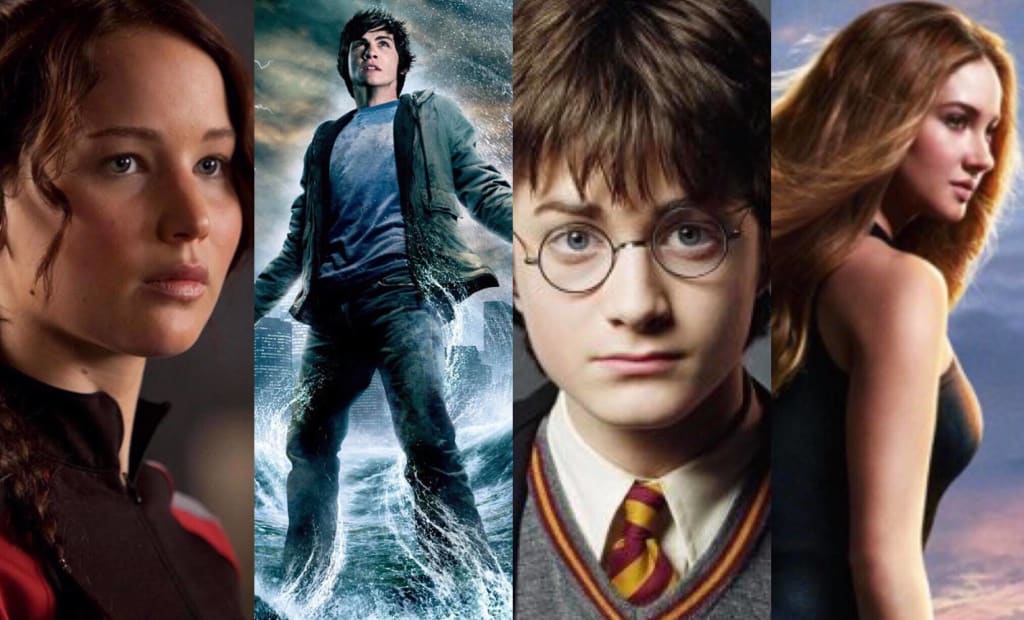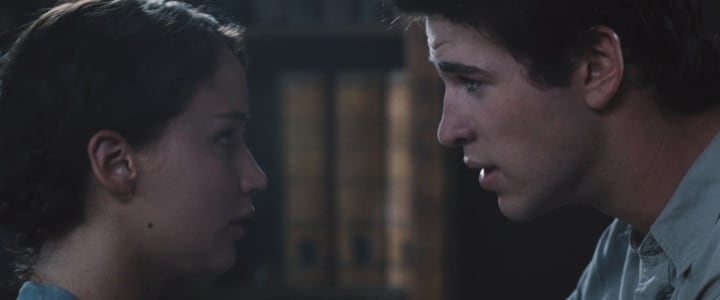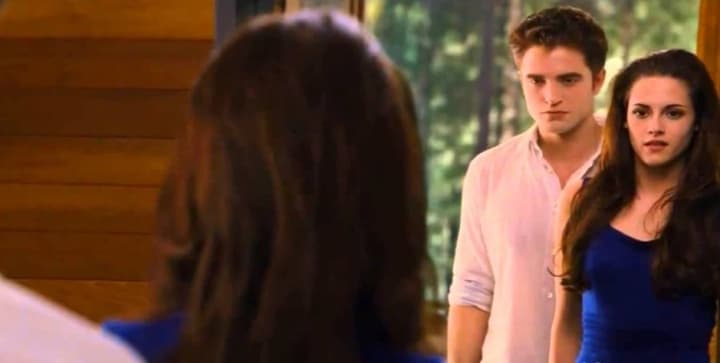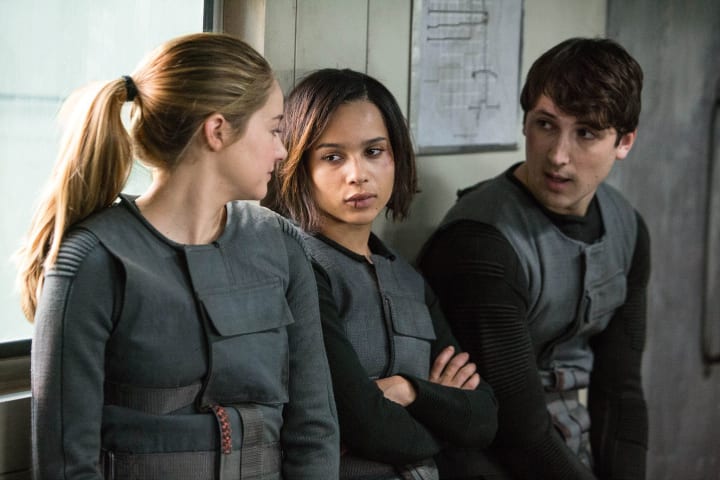9 YA Novel Clichés That Make Me Want to Stop Reading
"And it was all just a dream..."

Do you ever read a sentence of a book and just roll your eyes? Not because the character has done something stupid or embarrassing, or the plot has made a weird turn, but because you've read that somewhere before?
I'll be the first to put my hands up and say that I love the expansive genre of Young Adult. I love the corny romance, the chosen ones, the dystopian worlds, the peer pressure, and the psychotic antagonists. But there are some things I've read over the years that really grind my gears, only because I expected so much more from my beloved authors.
This article spreads light on all the cliches that really irk me when reading a really good book, which make me wish that they hadn't had the dull thought to include such a useless, basic thing.
I will be explaining some bookish examples, which may or may not contain spoilers. (Spoiler: They definitely do.)
1. Girls Who Faint When They're Overwhelmed
Let's start out with a relatively easy one, with lots of examples, I'm sure, but luckily for some authors, I can't think of any specifically.
This trope comes along the lines of the "and my world faded to black," in which an author doesn't know how to end a chapter so has the character black out.
It's not always a girl, but most often it is, and it's used as a way to get the love interest to catch the falling damsel, look after her, and to nurse her back to health. Or to reveal that the love interest you thought was a bad boy actually has a soft side.
There are better and more original ways to do this. I'm all for injuries causing characters to lose consciousness, but for them to just... do it to move the plot along really rubs me the wrong way. It's not romantic, and it's not exciting. It's lazy.
2. The Male Best Friend Being in Love with the Heroine All Along

Credit: The Hunger Games
And him not saying anything until she is with the obvious love interest.
Honestly. Why is this trope a thing? It normally occurs in instances where the female protagonist and male best friend meet when they're young and grow up together. There's normally a line where she says, "I'm sure one day I would marry **** and we'd have children together, but I never thought of him like that." And most importantly, it normally ruins their relationship.
Let's go into examples here. The most poignant is in The Hunger Games, where Katniss and Gale are best friends, but as soon as Katniss goes into the Games, she (slowly, I admit) falls for Peeta, and has to pretend to be in love with him regardless. Gale only gets jealous when he sees Katniss with Peeta, only kisses her after she kisses Peeta, only confesses how he likes her after she's already engaged to Peeta. If a 16-year-old and an 18-year-old were BFFs and really liked each other, surely something would have been said sometime when they were alone in the woods, or especially before Katniss got carted off to Panem to potentially be slaughtered.
Another example which is irksome is Kilorn and Mare in the Red Queen series. Once again, it's obvious the two care for each other, which is great when they're best friends, but it's only when Mare gets engaged to Maven, as soon as she becomes friends with Cal and introduces the two, that Kilorn finally reveal that he likes her. When things don't go his way, his ridiculously jealous self means that they're not on speaking terms for huge sections, not only for the first novel, but a few times throughout the series.
The annoying thing about this trope is that it doesn't prove anything about their friendship, as a friend would support another friend if they'd known them since childhood regardless of their feelings. If anything, it makes the male best friend look like an absolute douche.
3. Surprise! (But not really)... Everyone was part of it the entire time.
Whether "it" is everyone's an actor in the game like in Stephanie Garber's Caraval. Or like in The Maze Runner series, "it" has been a simulation this entire time and everyone, including some of your closest comrades, knew it was an experiment. Can you think of anything more annoying than when everyone except a small selection of characters, including the protagonist, apparently know everything?
Or that they're all actors in the great scheme of things.
Honestly, this is almost as big a cop out as what you get taught not to write by any teacher on this earth, and by that I mean, "and then I woke up and it was all a dream."
Be creative! It's much more fun than explaining all your hard work isn't as interesting as the reader thought it to be.
4. "The girl in the mirror didn't look like me."

There are too many instances of this trope to name them, so I'll keep my rant as short and sweet as I possibly can.
But why does this happen? If anyone can truthfully tell me they've looked in a mirror, at themselves, and not recognised the person looking back at them, I'll bow my head and leave this be. But who does that? Honestly?
I understand that magic and instances in Young Adult novels can sometimes mean that they're looking at a different version of themselves (such as Bella becoming a Vampire or Mare being painted Silver-blooded instead of Red) but this is such a ridiculous way of saying, "I look nice for this particular event and I don't know how else to portray that to the reader. Damn look at the girl. It me, but not really."
Stop this. It's lazy writing, and I'm not here for it.
5. A civilian being picked on by a higher force and then discovered as someone else unknowingly.
We, as readers, understand that for a protagonist to be the protagonist, there must be something interesting about them. We know they're the plot drivers and the story essentially revolves around them. That's kind of the definition: they're the good guy.
But that doesn't have to mean they're this entity that can be discovered by anyone and anything, even if it does have some sort of connection to the reveal of the plot's secret or a backstory somewhere in there.
For example, in Cinder, Queen Levana spots Cinder from a balcony in a palace, whilst Cinder is in a crowd. Now we know it's later revealed that Cinder is Princess Selene, Lunar niece of Levana, and that Levana's just spotting the Lunar in her in a crowd of Earthlings, but it's also revealed that there are many Lunars on Earth. How could Levana possibly even notice Cinder, in, and I'll repeat it again, a huge crowd of people?
It's the same as Percy Jackson all of a sudden being chased by monsters and gods, despite having his protector or his stinky, smelly (I can't remember how his mother described it... mask?) Gabe there to hide him from the mythological world. All of a sudden one person sees him, and then everything else in unravelled.
Likewise with Tris, whose completely average trials sparked the notice of Erudite, or with Katniss, who shouldn't have been a threat to the Capitol in anyway whatsoever, caught the attention of the Capitol long before she actually became a threat. I understand a narrative needs suspense, but do it in a way that gradually builds the strain between David and Goliath, rather than have Goliath be the immediate evil who spots David in a swarm of millions.
6. Dreams Giving the Protagonist Everything They Need to Know
Even masterpieces of our generation such as Harry Potter can fall into this lazy trope. Because that's all it is: a lazy, simple way to move the plot on and give character's clues they would never be able to find in any other circumstance.
"It all came to me in a dream."
Does anyone else dream of prophecies and their future tasks in ways that gives them answers? I get deja vu like the rest of you, but if I'm taking a test or going for a tough interview, I certainly don't dream about how to make it successful a couple of nights before it happens.
My dreams are made of weird nonsense that definitely wouldn't make sense in any book, perhaps with the exception of Lewis Carroll. So why are heroes' dreams so coherent that they give them the resolution to something they've been searching for in the conscious world for days?
7. A Female Having to Be Saved From Some Sort of Sexual Assault to Realise Her Saviour Is Her Hero
Not only is this trope sending horrendous messages to its young female readers, but it's ridiculously offensive.
Because a lot of love pairings nowadays, especially in paranormal or dystopian plot lines, come with the male and the female initially at odds with each other, you have to introduce a character that's even worse than the male lead to make the female see him for who he truly is: not as bad as initially portrayed, apparently.
A terrible but accurate example is between Violet and Kaspar in the Dark Heroine series. In the first novel, Dinner with a Vampire, vampire prince Kaspar kidnaps innocent human Violet and keeps her trapped in his palace. He sucks her blood, makes her life a living hell, keeps her away from her family (and a sister who has leukaemia) and—to put it in YA terms—is an all around jerk.
So what on this planet is ever going to make him attractive to her, except for his obvious good looks? One of his vampire friends obviously has to try to sexually abuse and kill her... Only then for Kaspar to swoop in, save her, and look like the good guy, even though he hasn't showed a shred of good in him up until this point.
It's the same with Laia in An Ember in the Ashes. To be fair, we know Elias is a much more decent guy than Marcus is. In fact, Marcus is as bad as it gets when respecting women is involved. But authors still shouldn't put protagonists in those sort of horrible situations just so she has to be rescued by her love interest. If they are going to portray those sorts of scenes, it should be done in a dignified manner, to show the real, disgusting, criminal act of it, rather than to use it as an instance in which someone can fall in love.
8. The Evil Queen Being... Get This, a Step-Mother
Hey, I'm all for tradition, but do we... really still have to do this?
People can be evil and power-hungry without marrying into the family. Biological parents can be bad too, or even complete strangers. Who has it out for the step-mothers?
Granted, with stories like The Lunar Chronicles, which retells the tales of Cinderella, Little Red Riding Hood, Rapunzel, and Snow White, an evil step-mother nods to the traditional fairy tale tropes which sees the evil mother as a non-biological component to which we have no feelings towards, even if it is still rather tired.
But new stories with updated ideals and ideologies should not let this silly little "rule" take over their stories. Aveyard's Red Queen series is just as fantastical as a fairy tale, yes, but it doesn't mean that Queen Elara has to be a step-mother. There's no motive to this, or is it just to point out that Cal is the good child and Maven is not? It's lazy to blame it simply on blood and genetics, rather than an interesting sibling dynamic or character background. All it means is Cal can go after Elara with a conscience because she's not his biological mother, rather than the much more interesting alternative.
9. The Quirky Best Friend Who Gets CUT As Soon As a Love Interest Turns Up

This is different from number two, trust me.
Because THIS is about the really interesting, fun, and charismatic best friends we're always introduced to in novels, but as the story goes on, and the hot, sexy, broody guy becomes all the more important, the best friend fizzles out. This trope is severely disappointing, because they're normally an interesting character who we would love if they were still included in the plot more often.
Vee in Hush, Hush is one of the more prominent that I can remember. She was a funny, loyal, interesting character who had a lot of insights into Patch coming into Nora's life. At first, very involved and eager to get Nora into the clutches of a male interest, but as the story went on, and with good reason, Vee became wary of Patch. And though she is still inserted into the plot of the narrative, she does dwindle as the story goes on, which sucks, because she is epic, and quite frankly, a lot more interesting than Nora.
The Conclusion
In reality, as often as I see these tropes and cliches, they're ultimately not going to stop me from reading the books, because I love the Young Adult genre too much. And it's not to say that the books I've mentioned are not excellent, because in many instances, they most certainly are.
However, in the future I do want to see more interesting plot lines, which take these simple plot devices and turn them completely on their heads so the reader is most certainly unhinged. We've become too used to these cliches in the general chain of events within a novel, and to see the reliance on that shattered would make a most interesting read indeed.
About the Creator
Leah Phillips
reader, writer, wanderer.
all social media = @leahphillipss






Comments
There are no comments for this story
Be the first to respond and start the conversation.